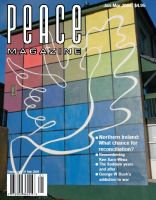
Peace Magazine Jan-Mar 2006, page 30. Some rights reserved.
Search for other articles by James Applegate here
By Gwynne Dyer McClelland & Stewart 2004 254 pages
When is the Iraq war not about Iraq?
When that illegal war threatens to wreck the UN forever. When Iraq sows the seeds of other wars, including the Third (and last) World War.
The acclaimed military historian, broadcaster and writer Gwynne Dyer makes these predictions in Future: Tense: The Coming World Order.
"The United States needs to lose the war in Iraq as soon as possible," Dyer writes. "Even more urgently, the whole world needs the United States to lose the war in Iraq." This is a provocative statement in a book packed with provocative statements.
Future: Tense argues that the Iraq war was already lost by April 2004, when serious American blunders ignited the fire of nationalism among average Iraqis, fuelling an unbeatable guerrilla war. The crucial question becomes when the Americans will leave. The relatively good news happens if the US exits Iraq soon and assumes a multilateral approach to global security. Then the world can defuse future wars by strengthening international law and institutions like the United Nations. America's traditional allies can "make it easy for the United States to get out of Iraq quickly without losing too much face."
The bad news happens if the US remains stuck in the Iraqi quagmire for the long term and continues the neo-conservatives' unilateral projection of American power. This hard-line position will undermine American relations with the rest of the world, while fueling Islamist extremism. Eventually, "most of the other great powers will give up on the United Nations and the rule of law..." Then these states will "drift back into the bad old world of alliances and confrontations." These great power alliances, both formal and informal, will promote deadly new conflicts, as in the First World War. Today's difference? Nuclear weapons.
This is Dyer's main point: Despite its shortcomings, the UN remains our best hope for survival. "The founders of the UN in 1945 were not trying to create an organization that would impose democracy, justice and brotherly love on the world. They were just trying to build an institution that would prevent a Third World War, and as many other wars as possible." Thus, Future: Tense plausibly predicts how the illegal U.S. war on Iraq could wreck the UN's project to replace aggressive wars with the rule of law.
The rest of Future: Tense is the thought-provoking story of radical Islamists, hard-line neo-conservatives, and the rush to war in Iraq. Dyer tells us that the the neo-cons who swept to power with George W. Bush in 2000 long dreamed of using raw military power to secure permanent global dominance, ruling the world through a new Pax Americana. Some neo-cons had planned to invade Iraq since at least 1996. "Whack Iraq and the world will realize who is boss," they thought.
These neo-cons seized 9/11 and compounded the tragedy--they hijacked the hijackers, and convinced the American people that Iraq was to blame, when there was no basis for this in fact. This illegal "preventive" war radically contrasts George W. and his father; the elder President Bush respected the United Nations and international law during the first Gulf War.
The war was not actually about oil, Dyer argues, as the U.S. can buy all it wants on world markets. And permanent dominance is delusional: By 2040, China may well be the world's greatest power. As for Islamism and al-Qaeda, the threats are real, but "deliberately and grotesquely exaggerated." To respond appropriately, we need to assess terrorism in the context of other threats, an argument Dyer develops in detail. In brief, 9/11 killed roughly 3,000 people; a global nuclear war could kill 3 billion.
Overall, Future: Tense combines lively writing and solid analysis. Dyer's arguments are convincing because they are anchored in a historical perspective encompassing the rise and fall of empires. What's more, Dyer makes us laugh, with sarcastic jabs at Islamists and neo-cons alike. For a dark prophesy of the coming apocalypse, it's a pleasure to read.
There is room for improvement. The lack of an index and footnotes is sloppy. Beyond that, statements like "The United States needs to lose the war in Iraq," will alienate mainstream American readers. And following Future: Tense's own logic, reaching American voters could actually benefit the coming world order.
Reviewed by James Applegate, a Vancouver writer.

Peace Magazine Jan-Mar 2006, page 30. Some rights reserved.
Search for other articles by James Applegate here